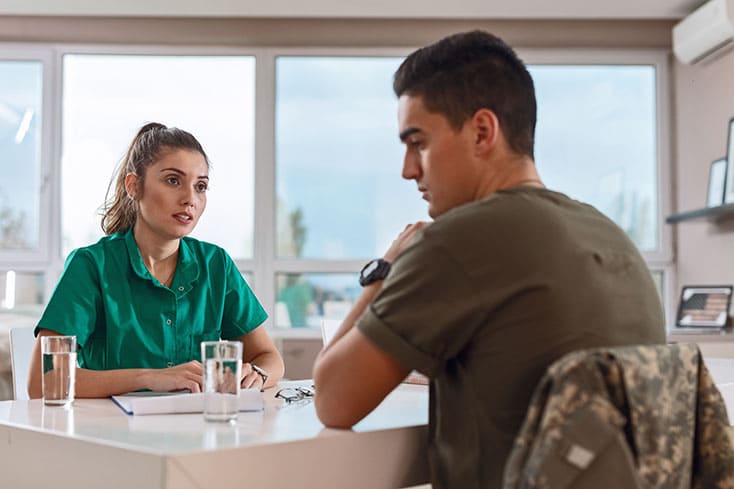August 23, 2021
By Sonal Patel, Ph.D.

To date, approximately 52,000 service members have been physically wounded in recent military conflicts. It’s also estimated as many as over 1 million live with invisible wounds of war, including post-traumatic stress disorder (PTSD), traumatic brain injury (TBI), depression, anxiety and other combat stress.
As director of Wounded Warrior Project® (WWP) Talk, a telephonic emotional support program, I’m honored to lead a team every day that helps veterans and their families improve their mental health and well-being.
Unfortunately, we know that stigma is often a barrier to talking about traumatic events and mental health concerns, especially for the veterans we help. A critical part of overcoming that stigma is addressing the mental health myths within the veteran community and society as a whole.
It’s time we address these misunderstandings and refute the myths. By setting the record straight, we can change the experience of veterans, their families and anyone battling invisible wounds.
Myth: I’m broken, and I will never get better.
Fact: You are not broken. You are human.
Your invisible wounds are not a life sentence. There may not be a “cure,” but you need to know that effective treatment is available and that you are not alone. Through interactive programs like WWP Talk, rehabilitative retreats, clinical care and social support, you can build the resilience you need to overcome your mental health challenges.
Myth: No one will understand.
Fact: Your journey is unique, but that doesn’t mean others can’t relate to your experiences or help you process your thoughts, emotions and struggles.
You don’t have to share the same trauma with someone to talk through what you’re experiencing. However, you do have to take that first step and be vulnerable. There are ways to work through your mental health challenges, and a significant part is being willing to talk about those challenges.
Myth: I didn’t “have it as bad” as others, so I don’t deserve help.
Fact: Your experiences are valid, and you deserve a safe space to talk about them.
It doesn’t matter what your experiences look like, how they happened or when they happened. It’s your trauma, and your recovery matters. You deserve to move forward from this and live a better, healthier life.
Myth: Only veterans have PTSD.
Fact: PTSD is not a civilian or military issue. It’s the brain’s response to trauma.
PTSD can affect any person’s mental health after experiencing any traumatic event — like combat, a natural disaster, a car accident or sexual assault. Veterans have a higher risk of PTSD simply because exposure to potentially traumatic events was a part of the job.
Traumatic stress is one of the most common self-reported injuries and health problems among veterans. For example, in the latest WWP survey of the post-9/11 wounded veterans it serves, 83% report living with the symptoms of PTSD. Symptoms include destabilizing thoughts, feelings or dreams related to the events, mental or physical distress, difficulty sleeping and changes in how a person thinks and feels.
Myth: Asking for help means I’m weak.
Fact: Seeking care for invisible wounds is a sign of strength.
Just like people cannot “wish away” symptoms of the flu, veterans with invisible wounds of war cannot wish those symptoms away either. And, unlike the flu, symptoms will not go away with time — a person must seek treatment to start their journey to well-being.
Sonal Patel, Ph.D., serves Wounded Warrior Project as director of the WWP Talk program, a telephonic emotional support program for warriors, family members and caregivers. In this position, Sonal oversees the team focused on program delivery with participants managing PTSD, TBI, depression, anxiety and other combat stress.
If you are beginning your recovery journey, please know you are not alone. There are multiple organizations dedicated to helping you navigate the challenges of mental health conditions and receive appropriate treatment. Veterans and service members who sustained a visible or invisible injury, illness or wound while serving in the military after Sept. 11, 2001, are eligible for WWP’s programs and services. For more information, visit WWP's website or call WWP’s Resource Center at 888-997-2586. The Veterans Crisis Line is also available every day, 24/7, at 1-800-273-8255. Press 1 upon calling.
We’re always accepting submissions to the NAMI Blog! We feature the latest research, stories of recovery, ways to end stigma and strategies for living well with mental illness. Most importantly: We feature your voices.
LEARN MORENAMI HelpLine is available M-F, 10 a.m. – 10 p.m. ET. Call 800-950-6264,
text “NAMI” to 62640, or email. In a crisis, call or text 988 (24/7).